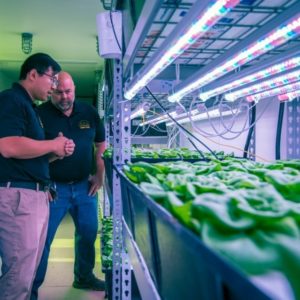
Experts are in agreement that one of the most effective ways to combat climate change is through an overhaul of our food system. Arizona State University chemistry instructor Zhihao Chen is working to take us one step closer to that reality.
How? Chen has created an innovative way of growing food called “cleantech.” A system that can work anywhere, cleantech is contained in two standard shipping containers. The first container is used to break down food waste, relying on a process called anaerobic digestion where certain bacteria under specific conditions break down the carbon chain in food waste, transforming it into fertilizer and methane. This container can process the same amount of waste an average grocery store discards each day.
The second container has rows of produce carefully grown in a controlled environment. It can grow any type of vegetable and is capable of producing about 1,200 heads of lettuce a month — the equivalent of two acres of farmland production. Chen’s system produces mature heads of lettuce in three weeks versus the 30 days it traditionally takes, doesn’t depend on climate and uses 95% less water than traditional methods.

Chen has tested out his invention at the ASU Polytechnic campus, where he is an instructor in the College of Integrative Sciences and Arts. He collects food waste from the campus and grows lettuce, which he sends back to ASU dining services. The implications of Chen’s invention are widespread; in a time where many supply chains are overwhelmed, cleantech can be used by cities to self-sustain while saving on long-distance transportation costs, energy costs and lower greenhouse gas emissions.
Chen and his startup Homer Farms are in talks with grocery chains Fry’s and Kroger at the moment. Fry’s is interested in putting the system in their parking lots to use their food waste.
"No pesticides, no chemicals or artificial fertilizers are used," Chen said. "It’s completely organic and you pretty much don’t emit any greenhouse gas emissions.”